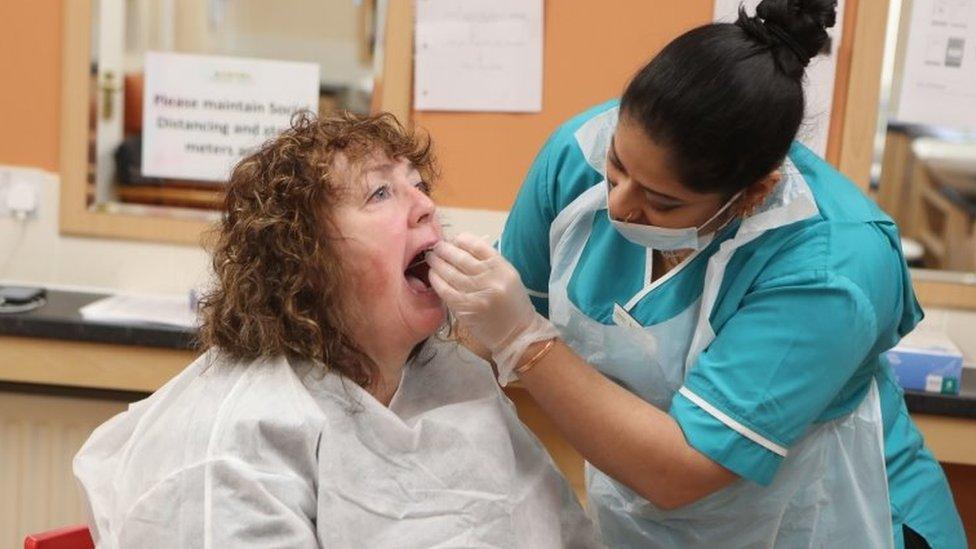Covid-19: Rapid tests for asymptomatic people to be rolled out
- Published
Asymptomatic testing for Covid can help "break the chains of transmission", Matt Hancock says
Regular rapid testing for people without coronavirus symptoms will be made available across England this week, the government has said.
The community testing regime - expanded to cover all 317 local authorities - uses rapid lateral flow tests, which can return results in 30 minutes.
Local councils are being encouraged to prioritise tests for those who cannot work from home during the lockdown.
The health secretary said asymptomatic testing can help break transmission.
Meanwhile, NHS England has invited tens of thousands of people over 80 to book vaccinations.
A further 563 people have died in the UK within 28 days of a positive Covid test and another 54,940 cases reported, according to government figures on Sunday.
The total number of deaths in the UK after a positive test passed 80,000 on Saturday.
The government has launched a campaign telling people to act like they have got the virus in a bid to tackle the rise in infections.
Under the national lockdown, people in England must stay at home and can go out only for limited reasons such as food shopping, exercise, or work if they cannot do so from home. Similar measures are in place across much of Scotland, Wales and Northern Ireland.

The Department of Health and Social Care said expanding the Community Testing Programme to more people without symptoms was "crucial given that around one in three people" who contract Covid-19 show no symptoms.
It said regular community testing using the rapid tests had already identified more than 14,800 positive Covid-19 cases.
So far, 131 local authorities in England have enrolled in the government's community testing programme, with Milton Keynes, Slough, Doncaster and Essex the latest to join.
'Worrying'
Health Secretary Matt Hancock said targeted asymptomatic testing and subsequent isolation was "highly effective in breaking chains of transmission".
But Angela Raffle, a consultant in public health at the University of Bristol Medical School, said increasing lateral flow testing was "very worrying" and warned the benefits of finding symptomless cases "will be outweighed by the many more infectious cases that are missed by these tests".
Defending lateral flow tests on the BBC's Andrew Marr programme Mr Hancock said mass asymptomatic testing in Liverpool had seen the case rate drop "more sharply than it did in other similar areas where only restrictions were brought in".

NHS Test and Trace will also work closely with other government departments to scale up workforce testing, the Department of Health and Social Care said.
Many are already piloting regular workforce testing, with 15 large employers having taken up this offer already across 64 sites, "including organisations operating in the food, manufacturing, energy and retail sectors, and within the public sector including job centres, transport networks and the military".
The Department of Health and Social Care said plans were already in place for rapid testing of staff and students in schools and colleges and staff in primary schools.
Asked when schools could reopen by the BBC's Andrew Marr, Mr Hancock said there were four conditions: that there is not a major new variant, the vaccine rollout is proceeding effectively, the number of deaths is falling and there is an easing of pressure on the NHS.
Businesses have welcomed asymptomatic testing.
Matthew Fell, of the Confederation of British Industry (CBI), which represents 190,000 UK businesses, said: "This expansion of testing will help more critical workers and those unable to work from home to operate safely, while also catching new cases more swiftly."
Business Secretary Kwasi Kwarteng said the safety of the workforce had been an "absolute priority" and said the expansion of testing means "we can keep our economy on the move while giving individuals in key sectors complete confidence that their workplace is safe".

LOOK-UP TOOL: How many cases in your area?
YOUR QUESTIONS: We answer your queries
GLOBAL SPREAD: How many worldwide cases are there?
THE R NUMBER: What it means and why it matters

But Prof Susan Michie, professor of health psychology at University College London, told BBC Breakfast the country would continue a "yo-yoing of lockdown" without a "test, trace and isolate system that actually works" and warned there needed to be tighter restrictions and tougher messaging than in March to prevent "tens of thousands of avoidable deaths in the next few weeks".
In other developments:
Prof Peter Horby, chairman of the New and Emerging Respiratory Virus Threats Advisory Group (Nervtag), which advises the government, has said people must take lockdown seriously as "we are now in the eye of a storm"
Two million people have been inoculated so far, Mr Hancock has said, adding that the government is on course to reach its target of 13 million people vaccinated by mid-February
British Medical Association chairman Chaand Nagpaul revealed that more than 46,000 hospital staff are off sick with Covid-19, which is beginning to affect the vaccination programme, the Observer reports, external
London Mayor Sadiq Khan has welcomed the opening of a vaccination centre at the ExCel Centre in east London next week - which he said would be crucial in helping to accelerate the rollout of the vaccine
The Oxford/AstraZeneca vaccine will be available in more than 1,000 locations in Scotland from Monday, the nation's government has said
Buckingham Palace said the Queen, 94, and the Duke of Edinburgh, 99, received Covid-19 vaccinations on Saturday - they are among about 1.5 million people in the UK to have had at least one dose of a Covid vaccine so far



